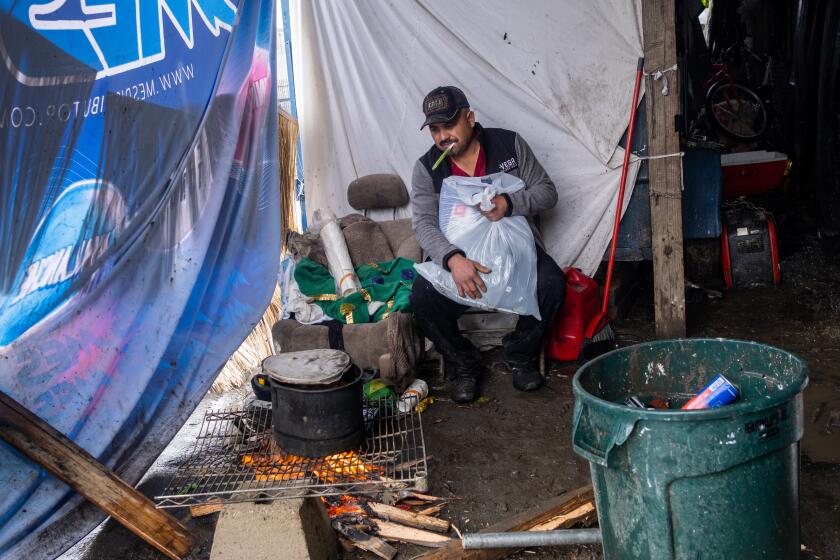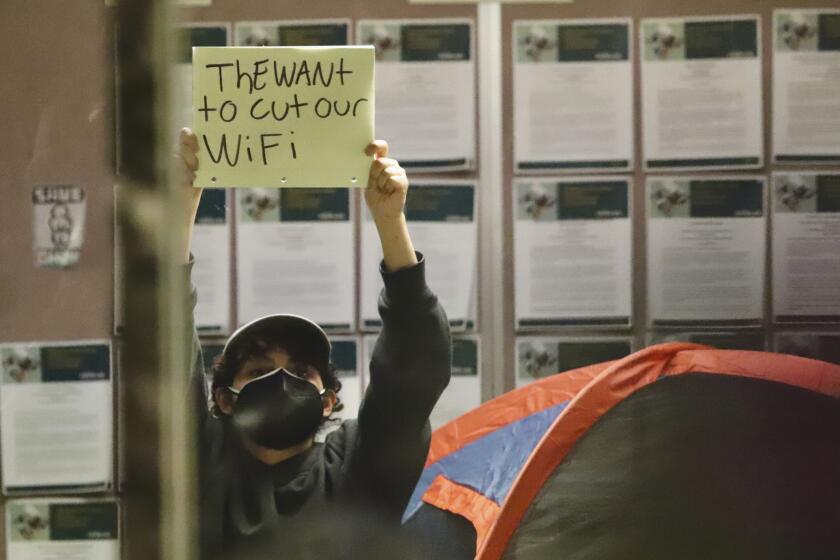Bad News for Social Service Groups : Supervisors Warn: Find an Alternative to Federal Funds
San Diego County supervisors issued a stern warning Tuesday to more than 50 private health and social service agencies: Find new sources of money or risk disastrous budget cuts at the end of this year.
Citing the threat of a social services catastrophe, the Board of Supervisors voted unanimously to tell the agencies that they should no longer depend on the millions of dollars in federal funds they get each year through the county.
Those funds, known as federal revenue sharing, have been targeted for elimination in the Reagan Administration’s proposed budget for the fiscal year beginning Oct. 1.
Even if President Reagan’s proposal is blocked in Congress, service agencies should be weaned from federal money by the end of 1985 and instead required to compete with all other county programs for money out of the county’s general fund, board members agreed during a conference session Tuesday morning.
Among local services now funded by the threatened monies are counseling for troubled youths, nutrition programs for senior citizens, and health care for the poor. Almost all the programs are intended for minorities or poor people.
Administrators of some of those services said in interviews Tuesday that their programs could not exist without the money they receive from the county.
They also argued that agencies funded by revenue sharing often save the county money by helping people overcome their problems before they enter the county’s medical services or criminal justice systems.
“I’m rather appalled,” Stephen Shubert, executive director of the Council of Community Clinics, said. “Community clinics have been providing care under county contract for 10 years. Without the revenue sharing, we’re going to have to start referring all these patients to the county medical service program. I think that’s going to put tremendous stress on that program.”
“Our Poway office would be decimated,” Nancy Ajemian, executive director of Harmonium Inc., a private, nonprofit youth and family counseling agency, said. “I don’t see how we could survive.”
Kathy Rollins, executive director of the Black Federation of San Diego, which counts among its services two shelters that provide emergency housing for more than 1,600 people a year, said the loss of revenue sharing funds would be devastating.
“The federation as we know it would no longer exist,” Rollins said. “The other funds we have fund other projects, but not the core of the federation. Basically, we could be closed down.”
But the three new members of the Board of Supervisors--Brian Bilbray, George Bailey and Susan Golding--argue that previous boards never should have funded the ongoing programs with the federal funds that are now in jeopardy.
“We’ve inherited a can of worms,” Bilbray said. “The county’s funding of these services has been based on a stick-your-head-in-the-sand approach, that when the revenue sharing gives out you can blame the federal government. We’ve got to say up front that you (the agencies) have to plan for a shortfall.”
If the programs don’t start looking now for funding from cities, private businesses or charity groups, Bilbray said, the county will be faced with a “social services Armageddon” when the federal funding sources finally run dry.
“That end, that devastation to the service providers, is not going to be so much if, but when,” Bilbray said.
Golding was also eager to alert the agencies that they ought not to depend any longer on receiving county funding that for the past decade has been routine.
“Whatever happens, we’re going to be faced with a lot of scrambling and cries that ‘we cannot survive,’ ” she said. “I don’t want to raise either false hopes or expectations.”
The federal revenue sharing program was begun in 1972 as part of an effort by President Richard Nixon to decentralize government. When the county began allocating funds under the program in 1973, it did so with the expectation that the money would be used to start programs that would later find their own means of support.
But revenue sharing was extended by Congress in 1976 and 1980, and eventually was looked upon as a permanent source of funding for a wide range of health and social service agencies.
Last year, the county received $12.4 million and allocated almost $7 million of that to private agencies under contract to provide certain services.
Among the agencies to receive money were 37 social service programs, 17 community clinics and 7 senior citizens’ programs. The contracts range from as low as $4,800--to train 40 senior citizens in ceramic crafts--to as high as $674,000 to pay for more than 32,000 patient visits to a community clinic.
More to Read
Start your day right
Sign up for Essential California for news, features and recommendations from the L.A. Times and beyond in your inbox six days a week.
You may occasionally receive promotional content from the Los Angeles Times.






